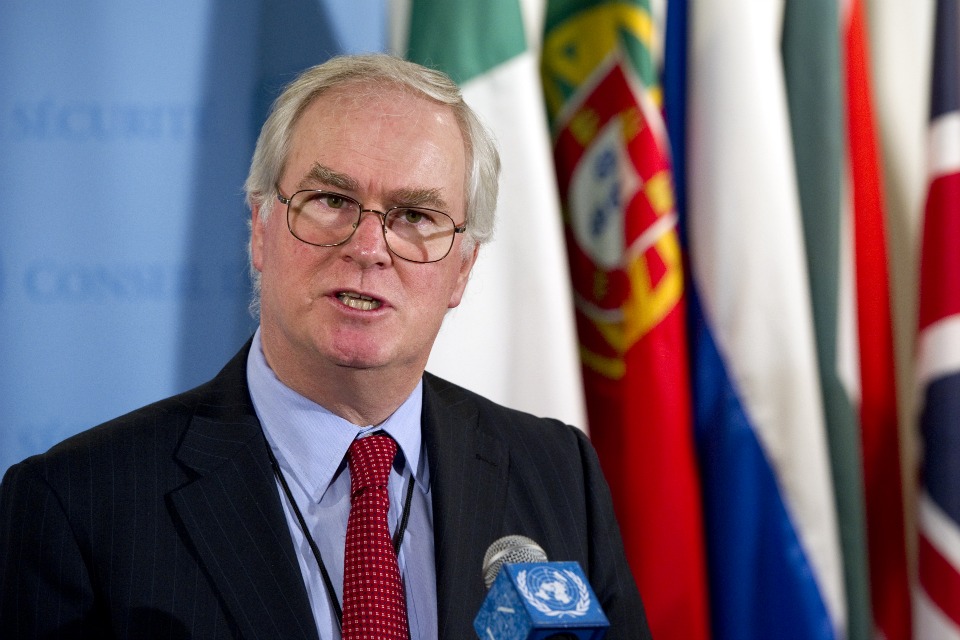‘Natural resources as an opportunity for countries emerging from conflict’
Statement by Ambassador Lyall Grant, UK Permanent Representative to the UN, to the Security Council Open Debate on Maintenance of International Peace and Security

I would like to thank the Deputy Secretary-General, Mr Kofi Annan, Ms Caroline Anstey, and Rebeca Grynspan for their informative briefings today.
Let me begin by expressing the United Kingdom’s disappointment that the Council was unable to agree a Presidential Statement on this critical issue.
And I would like to address directly the concerns of a few Council colleagues that the issue of natural resources and conflict falls outside of the mandate of the Security Council.
This is clearly not true. As almost all Council Members have remarked today, the Council has frequently had to deal with the ramifications of the poor governance of natural resources, and there are a significant number of countries on the Council’s agenda in which the weak management and illegal exploitation of natural resources has played a role in triggering, prolonging or escalating a conflict.
Of course a country endowed with natural resources will not inevitably succumb to conflict. On the contrary, an endowment of oil, gas, or minerals creates a genuine opportunity for growth and prosperity.
So the Council must use all of the tools in its toolbox to support countries to take advantage of these opportunities. Effective sanctions regimes and panels of experts can play an important role in curtailing the illicit exploitation of natural resources. Where we have mandated missions in resource-endowed countries, the United Nations can provide high level political advice and support to national governments on these issues, help build the capacity of national institutions, strengthen the rule of law and tackle corruption. In order to do this effectively, Missions must work in close coordination with the UN Country Team, the international financial institutions, and regional and international actors.
But the UN’s support to national governments is only one part of the picture. National leaders in resource-endowed countries must commit to building strong, transparent and inclusive institutions to ensure that their extractive industries do not fall prey to corruption or become a source of conflict.
The private sector and civil society are crucial partners in this endeavour. The private sector should ensure that their operations respect human rights, and take into account the needs of local communities, including through implementation of the Voluntary Principles on Security and Human Rights and the UN Guiding Principles on Business and Human Rights.
And an active and vibrant civil society can shine a light on corruption, and ensure that companies and national governments are held accountable for how they manage extractive industries.
Yesterday at the G8 Summit leaders recognized the potential of natural resources to be a key driver of strong, sustainable growth, if managed responsibly.
The G8 leaders agreed to take action to raise global standards for extractives transparency and make progress towards common global reporting standards, both for countries with significant domestic extractives industries and for the home of large multinational corporations.
In recent years, a number of international initiatives have helped to entrench an expectation of transparency and many of these were endorsed by the G8 yesterday.
The Extractive Industries Transparency Initiative is an excellent example of this and I am proud that the United Kingdom formally signed up to it this year. Likewise, since its start ten years ago, the Kimberley Process Certification Scheme has made huge progress in curtailing the flow of diamond revenues to rebel groups. Conflict diamonds are now estimated to represent less than one percent of the international trade in diamonds. In addition, the OECD’s Due Diligence Guidance for the Responsible Supply Chains of Minerals from conflict-affected and High-Risk Areas – of which the UK is a leading advocate – helps to build transparent supply chains, which in turn helps companies to respect human rights. A number of countries on the Council’s agenda have signed up to these initiatives, and we should make sure that UN missions are equipped to support them with their implementation.
The United Kingdom is doing its part. For example, we are providing support to Sierra Leone and Afghanistan to help them develop appropriate legislation for their mining sectors, build their capacity to negotiate contracts with the private sector and establish independent audit functions. We will use our chairmanship of the Voluntary Principles on Security and Human Rights from March 2014 to improve transparency and accountability in their implementation.
A natural resource endowment brings with it enormous stakes. It can bring considerable risks, especially in countries-affected by conflict. The Security Council should be prepared to act when those risks threaten peace and security. But we should also see natural resources as an opportunity for countries emerging from conflict. Managed well, they could hold the key to prosperity, growth and self-sufficiency and we must do all we can to help them achieve this.